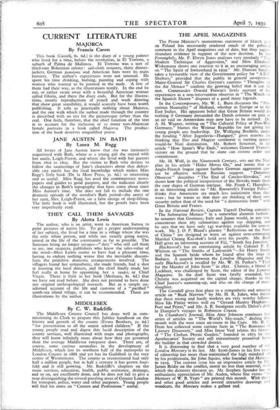THE APRIL MAGAZINES
The Prime Minister's momentous statement of March 3; on Poland has necessarily rendered much of the political comment in the April magazines out of date, but they supple abundant evidence in support of the new decision. In th,. Fortnightly, Mr. F. Elwyn Jones analyses very precisely " T.
Modern Technique of Aggression," and Miss Elizabetll Wiskemann shows one reaction to it in an encouraging article on "The Spirit of Switzerland in 5939." Mr. Duncan Sander takes a favourable view of the Government policy for " A.R.P. Shelters," provided that the public in general co-operates.
Major-General Sir Charles Gwynn's cautious " Thoughts on the Air Menace " confirm the growing belief that it can be met. Commander Oswald Frewin's lively account of his experiences as a non-intervention observer in "The Watch on the Spanish Shores " disposes of a good many legends.
In the Contemporary, Mr. W. L. Burn discusses the " Pre- carious Neutrality " of Holland, whether in Europe or in the East Indies. His apparent belief that Great Britain would do nothing if Germany demanded the Dutch colonies on pain of an air raid on Amsterdam may now have to be revised. Dr. A. M. Wagner' writing on "The Cultural Policy of Post-War Germany," blames the Weimar Republic for not giving the young people any leadership. Dr. Wolfgang Bretholz, under the heading " After Jugoslavia—Hungary," gives reasons for thinking that Slav and Magyar sentiment is turning against would-be Nazi domination. Mr. Robert Sencourt, in his article " How Spain's War Ends," welcomes General Franco's victory on the ground that he alone can restore order and contentment.
Mr. M. Wolf, in the Nineteenth Century, sets out the Nazi plan in his article " Hitler Moves On," and insists that an Anglo-French league against further German aggression can- not be effective without Russian support. " Danubian Observer " describes " The End of Czecho-Slovakia," and shows how the political inexperience of the Slovaks made them the easy dupes of German intrigue. Mr. Frank C. Hanighen. in an interesting article on " Mr. Roosevelt's Foreign Policy.- thinks that Americans are much less isolationist than the were ; but he warns us that they are thinking of their own security rather than of the need for " a democratic front " with Great Britain and France.
In the National Review, Captain Taprell Dorling considers " The Submarine Menace " in a somewhat alarmist fashion ; he assumes that Germany, Italy and Japan would, in any war. concentrate their 265 submarines against out shipping, and he says that we have only 145 warships available for convoy work. Mr. J. 0. P. Bland's gloomy " Reflections on the State of China " are designed to warn us against over-estimating Marshal Chiang Kai-shek's hold over his people. Mr. Basil Hall gives an informing account of Fiji, " South Sea Junction." Blackwood's has an entertaining article by Colonel F. E. Whitton on " The Smiths_ Ladysmith "—Sir Harry Smith and the Spanish 'bride wom he found after the siege of Badajos. A quarrel between the London Magazine and the early Blackwood's is recalled by Mr. W. M. Parker's "Trial for the Murder of John Scott " in 1821. Christie, a friend of Lockhart, was challenged by Scott, the editor of the London Magazine. In the duel Scott was fatally wounded, but Christie was acquitted on the capital charge, thanks to the Chief Justice's summing-up, and also- on the charge of man- slaughter. The Cornhill gives first place to a sympathetic and amusing article on " Buck Navvies'.' by Mr.. H. R. Jukes, who insists that these strong and hardy workers are very worthy fellows. Missy Ida Finlay -Writes well on " Gerard Manley -Hopkins— Poet and Priest," arid Mr. A. E. Sncidgrass recalls Defoe's debt to Dampier's vOyages in Robinson Crusoe. In Chcpnbers's ,Yourrial, Miss Amy Johnson continues her series of articles on "The World's Sky-roads," dealing this month with the west coast air-route to the Cape. Mr. R. E. Dean has collected some curious facts in " The Romance of Literary Discovery," -and Miss Irene Veal relates the history of "The Chelsea -Physic. Physic Garden," founded in 1673 by the Apothecaries' Society and still miraculously preserved from the builder in that crowded district.
It is distressing to find that a very good, number of t: London Mercury:is its last. Mr. Scott4ames in his five ye.. of editorship has more than Maintained 'the high standard by his predecestbr, Sir John Squire, whip foiinded tht Mercloy in 1919. The current issue has an impressive article by Mr. James Bridie on the conflict, moral no less than material, with which the dictators threaten us. Mr. Stephen Spender has an enthusiastic appreciation of Mr. Auden, whose fine verses " Memory of W. B. Yeats " are printed this month. With the and other good • articles and several attractive drawings ar .1 woodcuts, the Mercury makes a gallant end.










































 Previous page
Previous page